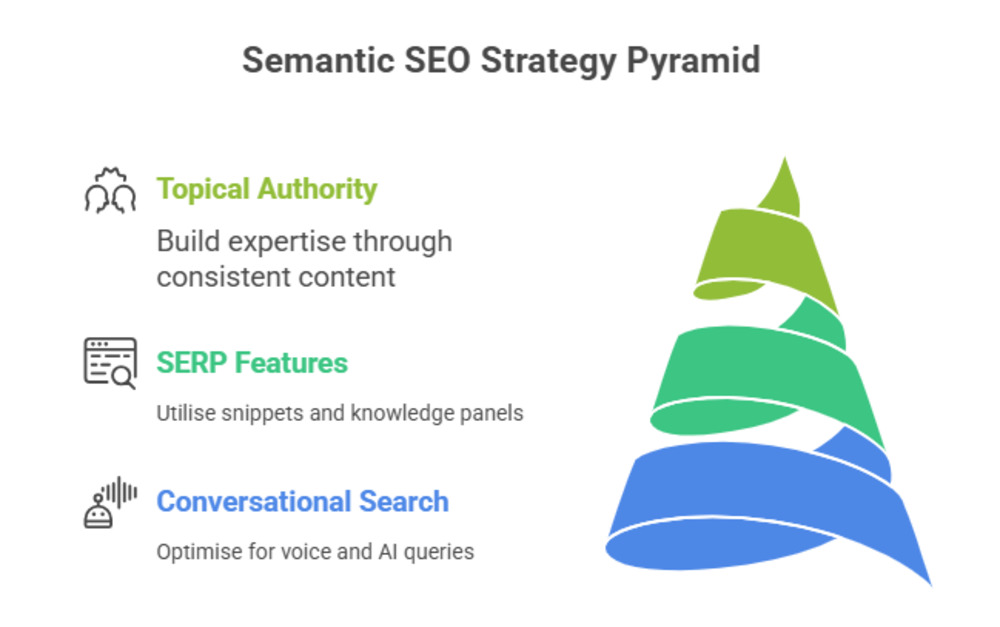Traditional keyword hunting feels a bit old-fashioned these days, doesn’t it?
Modern search engines have evolved far beyond simple keyword matching. They now understand context, intent, and the relationships between different concepts through advanced query understanding capabilities.
Semantic SEO represents this shift towards meaning-based search optimisation, helping B2B companies build lasting authority while attracting genuinely qualified leads.
Table of Contents
The Death of Keyword-Only SEO Strategies

The era of keyword stuffing for SEO is over. Search engines have evolved, and what now matters is providing real value and relevance to your audience.
Google’s Hummingbird update fundamentally changed how search engines process queries, introducing sophisticated semantic indexing that evaluates content meaning rather than keyword frequency.
Nowadays’s search algorithms powered by artificial intelligence and machine learning can spot keyword stuffing from miles away. They’ve become sophisticated enough to understand what users actually mean when they type queries into search boxes.
B2B companies face unique challenges here. Your prospects aren’t searching for simple products. They’re looking for complex solutions to intricate business problems.
Search intent has multiple layers, and your content needs to address every angle.
What Is Semantic SEO? Decoding Search by Meaning

Think of semantic search as having a conversation with someone who genuinely understands your industry. Instead of matching individual words, search engines now grasp entire concepts and their relationships.
To describe it simplest way, semantic SEO it’s the practice of creating content that covers topics comprehensively rather than targeting isolated keywords. The goal shifts from ranking for specific terms to establishing authority across entire subject areas.
Key Elements of Semantic SEO Strategy:
- Topic clustering: Building content hubs around central themes
- Entity recognition: Helping search engines understand your business context
- Contextual relevance: Creating content that answers related questions
- Semantic relationships: Connecting ideas logically throughout your site
The topic modeling approach works brilliantly for B2B companies. Instead of separate articles about “CRM software,” “sales automation,” and “customer data,” you create interconnected content that demonstrates deep expertise across customer relationship management as a whole concept.
By focusing on comprehensive topics and their relationships, B2B companies can greatly improve their relevance in search engines. Our SEO services specialise in these advanced semantic strategies, helping you create content that answers entire user journeys.
Understanding Entities: The Building Blocks of Modern Search
Entities are distinct, identifiable concepts that search engines recognise. Think of them as the nouns in the web’s massive conversation. The B2B companies entities might include your company name, key executives, products, industry terms, and even competitors.
For example, Google’s knowledge graph connects Salesforce (entity) with CRM software (concept) and Marc Benioff (person). These links, called entity linking, give search engines context and improve result accuracy.
Entity optimisation ensures your business is correctly identified and categorised, making your content a trusted part of the web’s knowledge network..
Practical Entity Examples:
| Entity Type | B2B Example |
| Organisation | Your company, competitors, partners |
| Concept | Account-based marketing, customer lifecycle |
| Person | Industry leaders, your executives |
| Technology | Software platforms, tools, integrations |
Semantic SEO Tools and Implementation Strategies
Building an effective semantic SEO strategy requires the right approach and tools. Start with comprehensive topic research rather than traditional keyword research.
1. Conduct Your Topic Authority Audit
Examine your current content through a topical lens. Do you comprehensively cover your core business areas? Most companies discover significant gaps when they shift from keyword-focused to topic-focused analysis.
2. Build Powerful Content Clusters
Topic clustering creates logical content hierarchies. Your pillar page might be “Complete Guide to B2B Marketing Automation.” Supporting cluster content could include specific aspects like lead scoring, email workflows, and integration strategies.
Internal linking between related pieces signals topical authority to search engines whilst improving user experience for visitors seeking comprehensive information.
3. Implement Schema Markup
Structured data helps search engines understand your content’s context and semantic context. Organisation schema, product markup, and service descriptions provide clear entity signals.
Schema markup and semantic markup act like content labels, making your information easily digestible for search algorithms whilst strengthening the semantic signals your site sends to search engines.
As for B2B companies, this might include:
- Organisation details and contact information
- Service descriptions and pricing models
- Team member credentials and expertise areas
- Customer testimonials and case studies
4. Master Semantic Keyword Research
Traditional keyword research focuses on search volume and competition. Semantic keyword research examines topic relationships and user journey stages. You’ll discover LSI keywords and keyword variations that support your main topics naturally.
Semantic keywords emerge from comprehensive topic understanding. When writing about marketing automation, related terms like “lead nurturing,” “drip campaigns,” and “customer segmentation” appear organically within valuable content.
The Unseen Semantic SEO Principles

For years, search engine optimisation was a game of keywords. To truly succeed today, you must move beyond the surface and into the deeper, interconnected world of meaning that governs how modern search engines think.
1. Optimising for Conversational Search
Voice search and AI assistants have changed how people find information. Natural language processing enables these systems to understand complex questions. Structure your content to answer the questions your prospects actually ask.
The People Also Ask feature provides excellent insights into related queries. Understanding these semantic connections helps create more comprehensive content that addresses multiple aspects of user intent.
Optimising for conversational search is crucial for staying competitive in today’s landscape.
If you’re looking to integrate conversational search with your paid campaigns, our Google Ads services can help enhance your search visibility and drive qualified traffic.
2. Leveraging SERP Features
Modern search results include various features beyond traditional listings. Featured snippets, knowledge panels, and local packs all benefit from strong semantic optimisation.
Entity disambiguation becomes crucial here. Help search engines distinguish between your “cloud solutions” and weather-related cloud content through clear context and proper markup.
3. Building Topical Authority
Topical authority develops through consistent, comprehensive coverage of your subject areas. This goes beyond individual page optimisation to encompass your entire content strategy.
B2B companies benefit enormously from this approach. Deep expertise demonstration through interconnected content builds trust with both search engines and potential customers.
Building topical authority takes time and strategy. As a digital marketing agency, we can guide you through every step, from topic clustering to advanced SEO strategies, ensuring long-term success in search visibility.
Beyond the Rank: Decoding Semantic SEO Success Performance
Traditional metrics like keyword rankings tell only part of the story. Focus on:
- Organic search traffic quality and engagement
- Bounce rate improvements across topic clusters
- Search visibility for branded and topic-related queries
- Content relevance signals from user behaviour
RankBrain and other AI systems evaluate these engagement signals heavily, making user experience optimisation crucial for semantic success.
To track your progress and refine your strategy, we offer custom SEO Packages, designed to help you achieve measurable results and improve your overall search performance.
Transform Your B2B Growth with Expert Semantic SEO
Semantic SEO is the future of B2B digital marketing, offering opportunities for companies to build comprehensive topic authority and stay ahead of competitors.
By focusing on complete user journeys instead of individual keywords, businesses can naturally improve content relevance.
Entity-based SEO strategies, such as those outlined in our Entity-based SEO article , are crucial for modern search success, establishing your business as an authority in your industry’s knowledge graph.
By our expertise in content marketing, we help B2B companies build unshakeable search authority. Don’t let your competition gain an edge.
Contact Newnormz today for a complimentary semantic SEO audit and see how meaning-based optimisation can elevate your B2B growth.






